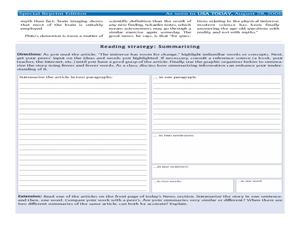Curated OER
11 - The Heat Is On
Pupils observe physical change of melting by observing substance in original state, melting substance, allowing substance to return to original temperature, determining if substance retained its original properties, and recording results.
Curated OER
Changing State
Students examine the changing states of water. In this solid, liquid, gas activity, students discover that water changes when heated or cooled. Students make predictions and then use the interactive whiteboard to "heat and cool" the...
Curated OER
The Universe Has Room for Change
In this universe and change worksheet, learners read about the demotion of Pluto as one of the 9 planets as well as other changes in science. Students summarize their reading and identify unfamiliar words in the article. Learners...
Curated OER
Ice Cream Chemical and Physical Changes
Fourth graders identify characteristics of a simple physical and chemical change. They describe objects by the properties of the materials from which they are made and that these properties can be used separate. Students describe the...
Curated OER
Water and Ice
Students examine the relationship between water and ice. In this physics lesson, students read the book Amazing Water and participate in an experiment where they freeze water into ice cubes. Students observe the changes in the water when...
Curated OER
Chemical Equations and Reactions
Graphic organizers, photos, diagrams, and text bring the world of chemical reactions to life. By viewing this presentation, young chemists learn how to recognize when a chemical reaction has occurred, and how to balance chemical...
Curated OER
Introduction to Gases
Students are introduced to gases. For this science lesson plan, students demonstrate that gases are a state of matter, generate a number of gases, discover some properties of gases, compare some of the properties of different gases, and...
Curated OER
Thermochemistry
In this thermochemistry worksheet, students indicate whether the given processes are endothermic or exothermic reactions. Students complete the phase change diagram as well as define a given set of vocabulary words. Students calculate...
Curated OER
As a Matter of Fact!
Students explore matter. They use a formula to measure the volume of matter.
Curated OER
As a Matter of Fact
Students rotate through various hands-on experiment stations to explore the concept and properties of different types of matter. They compare some properties of solids, liquids and gases and describe how matter changes from one state to...
Curated OER
Matter
In this matter worksheet, students are given 10 sentences with italicized terms that are wrong. Students correct the terms to appropriately fit the sentences. Topics are related to matter such as physical and chemical properties, solids,...
Curated OER
Chalkboard Challenge
In this PowerPoint, students compete in a quiz show game similar to Jeopardy in which they generate questions to match science facts in a number of categories. Science concepts covered include plants, animals, and matter. Due to the vast...
Curated OER
Matter
Third graders are introduced to the topic of matter. As a class, they brainstorm what they already know about matter and its properties. After completing a worksheet, they participate in an experiment in which they observe matter in...
Curated OER
What's the Matter? Where Did it Go?
Eighth graders analyze questions posted on a large poster in the room and work in groups to record their response to the question on paper, rotating to the next question after two minutes have passed. They review the characteristics of...
Curated OER
Matter Unit
Students create products from studying about matter that include: Make a "T" chart with matter and non matter items. Write a poem, song, or rap about matter. Five vocabulary words from the chapter must be included in the poem.
Curated OER
Matter: Build a Word
Fourth graders examine matter and the periodic table of elements. In this matter lesson, 4th graders discuss atoms and their composition. Students explore the periodic table of elements and use it to spell words out of the elements.
Curated OER
Water and Ice
Students explore water. In this water lesson, students explore the physical properties and states of water. They observe how water changes states and document what they see.
Curated OER
Water and Ice
Students examine water. In this chemistry instructional activity, student examine the physical properties of water and how it changes from a liquid to a solid or a gas. This instructional activity contains links to a second and third...
Curated OER
Water and Ice
Students explore the physical properties of water. In this water lesson, students observe, measure, and describe water as it changes state. There are 2 extensions for this lesson that one can access via the Internet links provided.
Curated OER
Water Cycle Stories
Students explore the water cycle. In this water cycle lesson, students simulate the water cycle by placing an ice cube in a Ziploc bag and observing the changes which occur over time. Students record the mass of the Ziploc bag and record...
Curated OER
Physical Changes of Water
Students observe changes in water. In this lesson plan about water and its forms, students perform an experiment to determine how water changes. Students analyze what causes water to be solid, liquid, or gas. Students record their...
Curated OER
Ice Cream
Open this instructional activity by giving a brief history of ice cream. Using liquid nitrogen to lower the temperature, preteens make their own confection. The accompanying activity sheet queries learners about freezing point, the...
Concord Consortium
Molecular View of a Solid
Why are solids, well ... solid? Take a peek inside a solid substance with an easy-to-use interactive. Science sleuths examine the motion and position of the atoms that make up a solid before drawing conclusions from their observations.
Curated OER
Exploring a New World
Fifth graders create a PowerPoint presentation about Christopher Columbus. The integration of technology helps them to be engaged in the subject matter. The basis for the information in the presentation is for students to answer some...

























